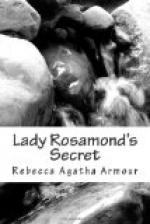Jasper Creagh found much pleasure in the company of his newly made friend, while the observant Colonel was well pleased by the preference which showed such judgment on the part of his eldest son.
Frequent allusions were made to the marriage of Lady Rosamond. This brilliant match had afforded much subject for gossip in the higher social circles. Lieutenant Trevelyan quietly listened to the earnest congratulations showered upon this union with apparent interest, often replying to the inquiries of Jasper Creagh with marked concern. His secret was unknown, he could brave the matter with heroic fortitude, while perhaps in after years, time will have effaced those fond memories. It was a bitter trial, but had he known that hearts more liable to succumb to the frailties of nature had borne up bravely against the struggling conflicts of feeling, the thought would have afforded some relief.
Captain Douglas in his boisterous jocose remarks had unconsciously been the means of aiming many unerring and merciless shafts at the heart of the despondent lieutenant. Mr. Howe, on many occasions, would generously have forced his companion to desist, but the sacrifice would have been too great. It were better that the secret remain untold even at the expense of a few such stabs.
In spite of the maneuvering conversational tactics of Mr. Howe, Captain Douglas could not resist the vein of humor which flowed in incessant remark upon those with whom it came in contact. “Lady Rosamond made sad havoc in Fredericton,” was his endless theme. “Look at Howe, judging from the length of his face the matter has assumed a serious aspect. There is some doubt as to the exact state of Trevelyan’s heart. If the face be taken as an index to the mind, we will pronounce his case as a milder type of the same disease.”
Many like jokes were passed around by the incorrigible Charles Douglas, but to all Guy Trevelyan was invulnerable. He betrayed no sign of the inward tempest raging within, save by the almost imperceptible expression which had attracted the scrutinizing eye of the generous hearted Mr. Howe.
The band of the 81st was a great source of amusement to the citizens. It daily furnished music on the Officers’ Square, which was entirely free to every peaceably disposed citizen. Another attractive feature was the frequent sights of numerous barges rowing up and down the river. The gay strains of music that floated upon the air, the flutter of bright-colored pennons, the waving of streamers, bright faces, merry hearts, and joyous song, made the scene both enjoyable and imposing. Frequently the excursionists landed on the islands above the city, enjoying the hours in roaming around the woody precincts, in merry conversation, outdoor sport, or the pleasure of the dance. Thus did the citizens spend the greater number of the pleasant summer evenings in the indebtedness of their military friends.
The band-master stood high in the esteem of all ranks and classes. Mr. Hoben had indeed succeeded in filling the position occupied by his predecessor in relation with the Philharmonic Society, sparing no pains in the instruction of every member.




